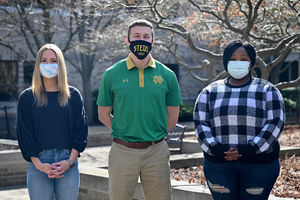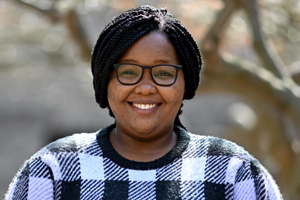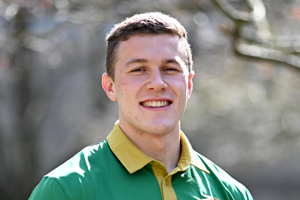
The Notre Dame Student Peace Conference, endowed by Joan B. Kroc and sponsored by the Kroc Institute for International Peace Studies, is an annual gathering organized by students and for students. Its mission is to provide space for graduate and undergraduate students from all colleges and universities to dialogue about peacebuilding, social justice and conflict transformation. Each year, the event draws hundreds of students from across North America and around the world. Due to the ongoing coronavirus pandemic, this year’s event will take place virtually from April 15-17, 2021.
This conference will focus on the theme, “Beyond the Surface: Moving the Needle on Global Peace.”
This year’s conference planning is being led by a team of four students:
- Oneile Gorata Baitloti (‘21), Political Science Major, Peace Studies and International Development Minors;
- Nicholas Clarizio, (’23), Political Science and French Major, Peace Studies and Italian Minors
- Grace Conroy (‘22), Business Major, Peace Studies Minor; and
- Conal Fagan (‘21), Political Science and Peace Studies Major.
Here they reflect on their hopes for the conference, the importance of peace studies, shifts to accomodate a virtual format, and what they are learning through the conference planning process.
As presentation proposals came in, what themes stood out or emerged from what was submitted? What types of content can people expect to encounter when they attend?
The committee received a total of 62 proposals for individual and group presentations.

Gorata: Some of the recurring themes that came through were around conflict resolution and mediation. I know that sounds like regular peace studies stuff, but at the end of the day these are people who knew they were submitting to a peace studies conference. What I look forward to is how they are pulling these themes together in unique ways: with different case studies and from so many different locations.
Nicholas: It’s quite hard to single one theme out, but one sort of gold thread that ran through all of them is that they were all looking to connect to something bigger. If it was an issue in Kenya, they weren’t just talking about Kenya, but they wanted to expand to make it relatable to everyone at the conference. So for me that interconnectivity of so many issues is what I found to be a commonality.
You’ve selected John Paul Lederach [Professor Emeritus of International Peacebuiding at the Kroc Institute] and Bridget Moix [U.S. Executive Director of Peace Direct] as your keynote speakers. Tell me about the process of selecting them and why these two speakers rose to the top of your lists?

Conal: We wanted to have both an internal and external speaker. I’ve read both their texts this year in class. For me, [John Paul Lederach’s idea of] the moral imagination is all about envisioning a brighter tomorrow. It sort of aligns with our theme of going beyond the surface and being able to dig deeper in search of a better future. This same idea came across in the proposals as well.
Gorata: In deciding keynote speakers, there is always a push to look outside, but when you are planning a peace conference in a University that houses the Kroc Institute, you have the top of the field people already here. For me, that was one of the things about having John Paul. It’s not just that he is a Kroc faculty member, but the fact that I don’t even remember having a peace studies class where we didn’t read something he wrote. That is how influential and impressive his body of work is. We knew that he would bring a wealth of knowledge to the conversations we are having.
We are all still living through the COVID-19 pandemic. How did that reality shape your planning or the conference schedule?
Conal: For some people this year, they may not bring as much firsthand experience, and may be taking a more theoretical approach.There may not be as much firsthand experience or research in certain parts of the world because COVID has prevented travel.

Nicholas: I think it has brought a sense of urgency to a lot of people. Not solely that they feel cooped up, but that at home they’ve had this large chunk of time since the pandemic, and people are looking wherever they can to make an impact. It’s brought a lot of innovative approaches. For example, we have one proposal that has to do with looking through national archives. It’s a very ambitious project and it’s impressive and we might not have seen that methodology without the pandemic.
Gorata: The sense I’m getting is that there have had to be a lot of pivots because of the pandemic. First, people recognize that the pandemic can’t stop the work from being done, but they maybe have to change methodology. Instead of being able to be in person or do primary research, some had to find secondary literature to deepen understanding. It’s been cool to see how people have been innovative in the way they keep peace processes going during the pandemic.
In past years, we two co-chairs have planned this conference, but you’ve been a committee of four. How has that enhanced your planning process?
Conal: Having four people has been a nice balance. It’s helped distribute work evenly and it’s been a better support network.
Gorata: What I’ve enjoyed most about this has been the amount of ideas coming from working together as a group of four, and the wealth and richness in this process. We’ve been very creative and had so many ideas around the logo or panels or how we want everything to happen. We’ve all been so involved that I struggle to picture what it would be for just two people to plan this event.

Grace: I have found that having four committee members has been a really great experience. We all work very well together as a team and each bring important ideas to the table. I have also gotten to know other peace studies students that I have not had classes with, and gotten to hear and learn from the experiences of two different seniors.
This is the first time the event will be virtual. As you’ve been planning, how has the virtual format allowed for creativity or changes to the usual schedule?
Nicholas: One of our intentions has been expanding to a more international audience and with the conference online, there’s no travel or funding issues with bringing people in. Every single proposal we get is potentially a part of the conference and we’ve done a good job of expanding our reach.
Conal: Gorata and Grace have really been focused on the schedule and how it is starting to build out is exciting.There has been such a range of topics in the proposals. Honestly the standard of the submissions we received was crazy good. We wanted to squeeze every one into the schedule if we could. In the end, we have a really diverse set of submissions that will really enhance the conference and hopefully bring in new people that haven’t attended before.
What is the one thing you’re most excited about at the conference?
Grace: I am most excited about hearing all of the presenters and finding new areas of interest from their presentations. We had so many great proposals! I am also excited to orchestrate the first ever virtual conference, as it will give many more individuals the opportunity to get involved and join us.
Conal: I love planning the conference, but it will be really nice to see the end product. I am really excited for the conversations that we are going to have. Notre Dame senior Elsa Barron is hosting an environmental panel, which is really exciting.
Gorata: The planning has been great, but during the conference I just get to be a student and learn from all these people who’ve spent so much time creating what they want to share with us. I’m excited that I get to sit there and receive what they are giving.
Nicholas: I’m looking forward to a lot of the presentations. With the scheduling that Gorata and Grace have done we’ll be able to integrate a decent amount of informal time, so I’m looking forward to meeting a lot of the presenters and getting their perspective outside of formal sessions.
To register and for more information about the conference, visit sites.nd.edu/peacecon. You can also listen to a podcast interview with the conference planning committee at go.nd.edu/PeaceConPod.